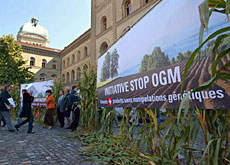Government recommends a “no” and a “yes”

The government is advising voters to reject a people's initiative calling for a five-year moratorium on genetically modified organisms (GMOs) in Switzerland.
But it is calling on the electorate to vote in favour of allowing shops at major railway stations and airports to open on Sundays. The two issues go to a nationwide vote on November 27.
Economics Minister Joseph Deiss told a news conference on Monday in Bern that a moratorium on GMOs in agriculture would be bad news for farmers and consumers.
Deiss said that the current law on the issue, which came into force last year, provided enough protection for people and the environment.
The present legislation is aimed at strictly controlling GMOs. It forbids the keeping of genetically modified animals in agriculture for an indefinite period, whereas the initiative foresaw five years.
Strict procedure
Deiss said that under the law the procedure for authorising GM crops lasts at least five years – as long as the moratorium. He added that no demand for such an authorisation had yet been made.
He noted that a moratorium would give the wrong signal to the scientific community and would be harmful to economic sectors linked to research.
Deiss said that the government and parliament were against the banning of developing technologies.
“If we want to maintain our living standards, we must be with the new value-creating technologies, otherwise we will be in danger of sliding,” he commented.
Labour law
Voters are being urged to vote “yes” to a revision of the labour law to allow Sunday trading at shops at the 25 largest railway stations and a number of airports operating scheduled flights.
A revision would anchor what already happens in the larger stations and airports into the law.
“Shopping in such centres meets a need among the public,” said Deiss.
If the revision were to be turned down, the State Secretariat for Economic Affairs would have to withdraw permission from the 120-150 shops that already open on Sundays. This would affect about 2,000 jobs.
They represent less than 0.5 per cent of the 360,000 people already working on Sundays in other sectors, including hospitals, transport and hotels.
Trade unions warned on Friday that moves to relax Switzerland’s tough Sunday trading restrictions will lead to a seven-day working week across the country.
swissinfo with agencies
Swiss voters go to the polls on November 27 to decide on:
A popular initiative calling “for food produced without genetic modification”
and a modification of the labour law concerning Sunday opening hours in shops at major public transport centres.
In March 2003, parliament voted in favour of the law governing genetic modification. During the debate, it turned down a moratorium on GMOs.
A popular initiative “for food produced without genetic modification” demanding the moratorium was handed in to the federal chancellery in September 2003.
It demands that all commercial use of GMOs be abandoned for a period of five years.

In compliance with the JTI standards
More: SWI swissinfo.ch certified by the Journalism Trust Initiative



You can find an overview of ongoing debates with our journalists here. Please join us!
If you want to start a conversation about a topic raised in this article or want to report factual errors, email us at english@swissinfo.ch.